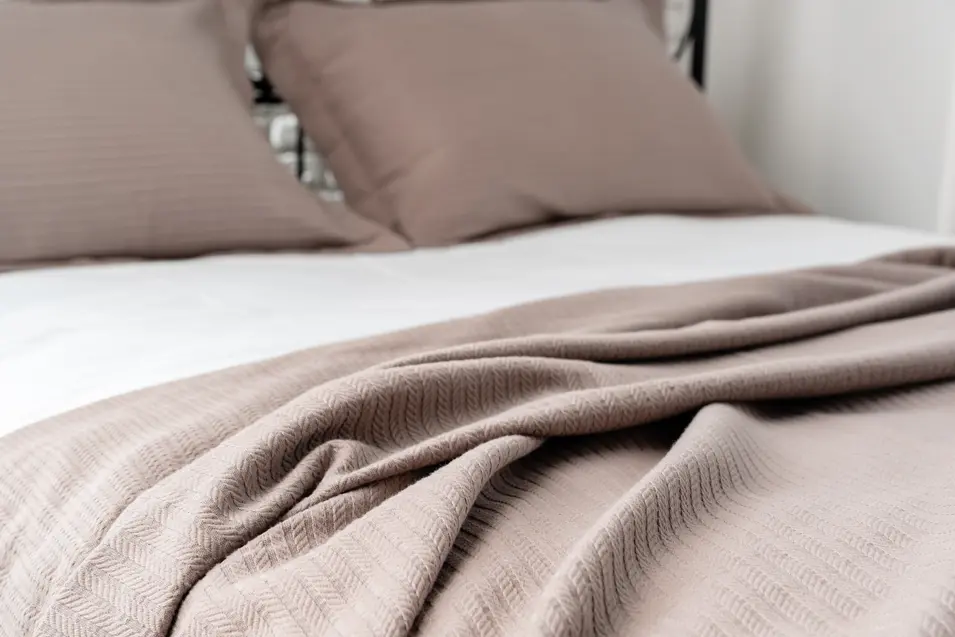We’ve made paper from trees for years, so why not bed sheets? Eucalyptus sheets, crafted from eucalyptus tree fibers, are stronger than cotton and often outlast other plant-based fibers. Well-made eucalyptus sheets wear better and offer long-lasting comfort.
Like many innovative bedding products, eucalyptus sheets reflect manufacturers’ efforts to go green. But what makes one textile better for bedding than another?
Textiles for Bedding
Various textiles are used for bedding, each vying for attention on store shelves. They include:
- Natural fibers, like cotton
- Biobased fibers, derived from plants and processed with natural organisms and enzymes, making them biodegradable
- Organically produced fibers, meeting U.S. National Organic Program (NOP) standards or similar
- Plant-based fibers, such as cotton, flax, and hemp, grown specifically for textiles
- Synthetic fibers, like polyester and nylon, made from petroleum and carbon derivatives
- Man-made or “regenerated” fibers, using natural ingredients altered chemically, such as cellulose-based rayon, viscose, and modal
Eucalyptus fibers, like other tree-based fibers, are regenerated into cellulose for textiles, distinct from the paper-making process.
Why Choose Eucalyptus Sheets?
Eucalyptus Fibers
Eucalyptus trees produce some of the shortest hardwood fibers, measuring about 0.65 mm (0.025 inches), compared to softwood fibers like pine at 2 mm (0.078 inches). These fine fibers resist collapsing, staying soft and bulky, which is ideal for comfortable, durable textiles.
Fabrics from Eucalyptus
Over a decade ago, Austrian company Lenzing pioneered eucalyptus fabric, setting global standards for man-made cellulose fibers like viscose, modal, and Tencel. Tencel, made using an eco-friendly closed-loop system that reuses solvents, is particularly sustainable. In 2009, U.S. manufacturer Valley Forge Fabrics partnered with Lenzing to produce eucalyptus sheets in America. After initial challenges, they developed a Tencel variant, and today, Lenzing Fibers Inc. is North America’s sole producer of this fiber.
Eucalyptus sheets offer natural antibacterial and antimicrobial properties, minimizing dust mites, as confirmed by the American Society for Testing and Materials. They become softer and more absorbent with initial washes and are durable enough for the hospitality industry, where sheets endure frequent washing.
Eucalyptus fibers are classified as Lyocell by the Federal Trade Commission, distinct from bamboo’s viscose rayon, which uses toxic chemicals. Lyocell production involves a single, non-toxic solvent that’s recycled, making it eco-friendly. Valley Forge Fabrics also blends Lyocell with cotton or polyester for added versatility. While eucalyptus sheets are pricier, they’re easy to wash and resist wrinkling.
What People Say About Eucalyptus Sheets
Many choose sheets made from Lyocell or eucalyptus for their unique feel. Reviews vary, reflecting differences in quality and preference. Here are ten comments from online reviews:
- “These are the best sheets I’ve ever slept on.”
- “They’re cool and wonderful.”
- “Not a good green product.”
- “I really like their softness.”
- “They’re extremely soft and so comfortable to sleep in.”
- “They breathe well but still feel durable and strong.”
- “I do NOT recommend these sheets at all.”
- “I love this sheet set! After a year of washing and drying, they’re still perfect and super soft!”
- “Don’t waste your money.”
- “Just bought a second set yesterday and love them.”
As with any product, opinions on eucalyptus sheets vary. Quality matters, so choose sheets from reputable manufacturers and opt for the best you can afford. Share your experience to help others make informed decisions.






One Response
UH . . . even Lenzig with their Tencel and Modal brand rayon advise that the pulp used is not 100% Eucalyptus, rather a mix of pulps that also include Eucalyptus. Many of the so-called “Eucalyptus sheets” don’t use Tencel, rather they use generic versions from China with little or no solvent re-capture. It would be nice to have some actual validation and a ZDHC certification attached to these spurious claims of eco-friendly. The eco-friendly claims seem to have no substantiation whatsoever outside of Eastman’s new NAIA and Lenzig’s Tencel. We even have BS Bamboo manufacturer’s once again claiming (fraudulently) that they are antimicrobial and if that fraud weren’t enough, they claim “organic.”